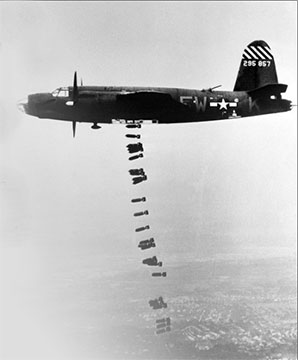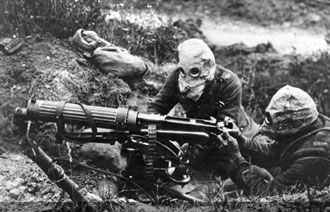War machines
The war is based on a crass error. Men have been mistaken for machines. Machines, not men, should be decimated. At some future date, when only the machines march, things will be better. Then everyone will be right to rejoice when they all demolish each other. (Hugo Ball, diary entry written as World War I got underway (ca. 1914), later printed in Flight out of Time, 1927)
We've now looked briefly at the two biggest technological shifts of the last millennium: the Industrial Revolution and the Information Age. How do you suppose each of these shifts has changed one of the oldest of human activities: war? Let's just look at the last hundred or so years here.
In the first part of this lesson, I will be applying ideas from the Machine lesson - mechanization and the Division of Labour. In the second part, the concepts of The Spectacle and hyperreality from the lesson on electronic media seem more relevant.
The evolution of large-scale war in the ten decades of the previous century represents a terrifying arc from the trench warfare of World War I to the smart bombs of the Gulf War. Though the killing may seem to have gotten more precise or efficient, I think there is something to be terrified by in each technological advance.
The First World War (1914-1918) was the first war to make extensive use of modern technology: airplanes, submarines, tanks, chemical weapons, and modern artillery. The war was seen by those who took part in it as a war of unprecedented bloodiness, gruesomeness, meaninglessness, and waste of human life. Some people called it "The War to End All Wars" and assumed that the horror would stay with humanity for a long time to come. World War II, however, came only 20 years later. It brought refinements to the technologies of World War I, and new tools, including long-range missiles and ultimately the atomic bomb.
It might seem that our current technology - computers, drones, satellite systems, "smart bombs," cyberwarfare, and the rest - have made the kind of large-scale, global carnage seen in the two world wars obsolete. Is war becoming "more civilized" and less wasteful - at least for the most powerful and technologically advanced nations - as we move further into the 21st century?

If we look back again at how the machine age transformed human labour we may find that some of the same general trends occurred in the "labour" of armed combat. For instance, there was an increasing desire to replace men with machines. The machines could kill more, and faster, and in some cases they required less skill on the part of the human operator than the war "machines" of the past (the sword, the catapult, the crossbow, the rifle). Did the increasing automation of the killing process make for a better war?
As I mentioned, the first World War (1914-1918) was experienced by virtually everyone involved in it as a revolting fiasco - a costly and pointless bloodbath. Perhaps never before had there been death and destruction on such a large scale and had the effort seemed less worthwhile. The European conflicts with the largest death counts in 19th century had been the wars waged by Napoleon for world conquest, with casualties estimated as high as 6,000,000 people. A hundred years later World War I claimed almost three times that many lives. Technology definitely contributed to that increased death count.
Killing became indiscriminate but easy with innovations like the tank, aerial bombardment and strafing, and the machine gun. Such tools, like most machines, augment the human "operator" beyond anything they could achieve by themself, and create an uneven "playing field" for the old-fashioned infantry soldier. A soldier on the ground armed only with a rifle has little chance against a tank or a machine-gunner. In any particular conflict, the side with the most advanced killing technology will likely have the upper hand in combat.
But the effects of mechanization on warfare arguably go beyond the increased output of corpses. The machine gun can fire as fast as a team of 500 riflemen; its operator need not worry about accuracy the way a rifleman must. This removes war further from the embodied, immediate, and often almost "personal" forms of combat that preceded the Industrial Revolution and closer to the kind of remote control warfare we are familiar with today.
In its sheer speed, indiscriminateness, and volume, does the machine gun somehow depersonalize death? Does it mass-produce slaughter in a way that makes the killing harder to "appreciate," in some sense, less real, less meaningful? It may not really be an efficient killing device (a lot of bullets go to waste), but it does seem to be quite an effective one. It adopts the principles of rapid mechanical mass-production disposable commodities (bullets) to the act of dealing death.

Machine gunners in WWI wearing gas masks to protect themselves from the new innovations of chemical warfare.
How does this impact the humanity of the operator of the gun? They aim their weapon at a line of soldiers (or even indiscriminately into the mist), pull the trigger, and sweep across the horizon, mowing down perhaps dozens of people in less than a minute. Does the operator have the same sense of this carnage that a rifleman sees in the fall of the single enemy he kills? Obviously neither of those experiences is anything like hand-to-hand combat with swords, knives, clubs and so forth. Can a person even process the experience of murder on such a scale and with such an indiscriminate machine? The novelist James Jones has a character who dwells on the peculiarly de-humanizing quality of death of this kind:
He could not believe that any of [the bullets] might actually hit somebody. If one did, what a nowhere way to go: killed by accident; slain not as an individual but by sheer statistical probability, by the calculated chance of searching fire, even as he himself might be at any moment. Mathematics! (The Thin Red Line, Chapter Four)
The weapons of the industrial age were designed to maximize death while minimizing human skill, risk, and engagement in it. In terms of death production they were a resounding success. A side feature was perhaps that they removed the killer somewhat further from the killing than had previously been the case, and thus robbed the deaths further of their "meaning," if they could be said to have any. A bombardier who drops his payload from 2000 feet has limited control of the targeting, and sees none of the victims die.